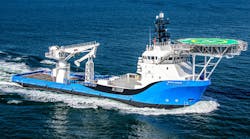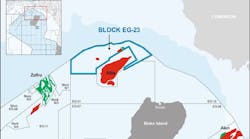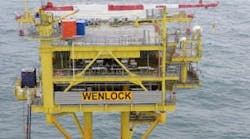Hopes were hung high on the Shah Deniz prospect in the Azerbaijan sector of the Caspian Sea. After years of investment, the world was still unsure of the potential of the area. Some geologists had likened its possible reserves to equal or greater than the Middle East, while others had doubts. During the past few months, two consortia ceased operations in the Caspian and headed home, casting a further shadow on the region's prospectivity. Nevertheless all eyes were on the BP Amoco-led consortium drilling on the Shah Deniz structure as possibly the last bastion of hope - and it delivered.
BP Amoco announced that the first well in the field flowed 50 MMcf/d of gas and 2,965 b/d of condensate. A second well is underway. Reserves have been posted at 400 bcm proved and an estimated 700 bcm qualifying the field as "world class" and providing a breath of fresh air into the Caspian.
The find boosts the overall potential of the region and proves that life exists in the Caspian. The find also will allow the Azeri's to supplying neighboring Turkey's energy needs as well as the needs of the myriad pipelines running around the region. So with the drilling of one well, hope has returned to the Caspian Sea.
Mobil asked to pick up slack off Nigeria
Nigeria has gone from notoriously exceeding OPEC-installed quotas to being in danger of not meeting it. With social disturbances in the oil-rich Niger Delta shutting in a vast amount of Shell's oil, the country is threatening to come up short on its OPEC-imposed 1.885 million b/d export quota. To remedy this situation, the Nigerian National Petroleum Company has turned to another of its major producers, Mobil, to pick up the slack.
Mobil has a capacity to produce and export around 700,000 b/d of oil, but is only producing 500,000 b/d due to cutbacks to meet the OPEC quota. Most of the company's operations are offshore and deemed safe from a majority of the social disturbances.
Shell, on the other hand, has a large onshore infrastructure with capacity to produce over 1 million b/d. The company has been continuously hindered by community disturbances and has even called a force majeure on Nigerian exports. Reports on the volume of production shut-in vary. Shell's production is estimated to be between 100,000 b/d and 715,000 b/d, of their one million capacity.
While no reports have been made yet as to how much Mobil will be able to open the valves, this comes as good news. Oil prices continue to stay above the $20 mark. The social disturbance in the Niger Delta has been a nuisance to oil companies for a long time and the new government of President Obasanjo promises change. But now that OPEC numbers have gotten involved, a stronger urgency appears to be warranted.
Following the request to Mobil, Obasanjo said that his government had submitted a bill to parliament to establish a new development commission for the Niger Delta. This is expected to decrease the disturbances.
Obasanjo has already made serious waves within the country's oil industry. He has established a goal of increasing Nigeria's oil reserves from 25 billion bbl to 30 billion, in addition to increasing production from 2 million b/d to 3 million b/d - currently a difficult goal to meet.
However, he has taken a strong stance on corruption by revoking 15 deepwater licenses made by the former government. Coincidentally, indigenous Heritage Oil and Gas is suing the government for one of the cancellations. In addition, Obasanjo promised to double penalties for flaring gas associated with oil production.
In any event, the Nigerian government has made promises like this in the past and with little effect. But, hopes for the new President are high and most feel like he may have the clout to enact a change. But the change needs to come quickly before OPEC comes looking for its oil.
Brazil tops priority list for producers
Even though the bidding round has ended and contracts are in the final stages of being signed, oil companies cannot wait to cash in on the Brazilian oil industry. In the past few months, several of the big players in the industry have signed on for some pretty hefty sums to get into the Brazilian market. And what's a better way to get the foot in the door than teaming up with the local expert - Petrobras.
Petrobras has signed its 20th partnership venture for exploration areas for a total investment of $2.48 billion and is finalizing negotiations on several others. The typical contract structure is for Petrobras to retain a 35% interest in the block and farm-out the remaining ownership. Some recent examples are:
- Unocal signed on with Petrobras for a 35% interest and operatorship of the BC-9 Block in the Campos Basin off Brazil.
Other partners in the deal include Japex Brasil (20%) and YPF (10%).
- Mobil has prioritized Brazil as the top of its investment portfolio. The company plans to spend $90 million in two exploration projects with Petrobras. One with Unocal for Block BES-2 in the Espirito Santos Basin. Mobil will operate with 35% interest and Unocal will take 30%. And the second with Shell for Block BC-10 in the Campos Basin. Shell will operate with a 35% interest and Mobil and Exxon will hold 15% each. As part of this, Shell has announced plans to invest $2 billion if it makes a discovery.
- Texaco also got into the game with an agreement for Campos Basin development blocks BC-4 and Frade. Texaco will operate with a 42.5% interest. Nissho Iwai/Inpex and Odebrecht also hold 15% interest in the agreement.
- Amerada Hess also announced plans to invest $100 million as part of its joint ventures with Petrobras in the Santos and Campos basins. The company is the operator of blocks BC-8 and BS-2 with a 32% interest in each.
When the Brazilian oil industry opened and Petrobras was forced with competition for the first time in 45 years. Some thought that the 15th largest oil company may see its standing in the world fall. Others thought that the company might pull out all the stops and pick up the pace and try to drive out the competition with its expertise. But it seems Petrobras is doing neither. The company is welcoming the competition and even giving them a large stake of its action.
Why not? Why should Petrobras try to compete, when it can let other people find the oil, proven to be there, and invest the majority of the money? Now Petrobras can sit back on its laurels with its 35% interest. Petrobras' partners are not complaining. They have access to one of the hottest plays in the world with the leading authority in the region watching their back.






